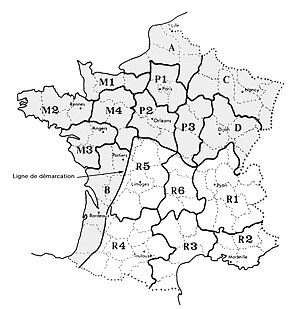Maquis des Glières
| Battle of Glières | |||||||
|---|---|---|---|---|---|---|---|
| Part of Second World War | |||||||
 Geographic organization of the French Resistance showing the Haute-Savoie and Rhône-Alpes region in R1 |
|||||||
|
|||||||
| Belligerents | |||||||
|
|
|||||||
| Commanders and leaders | |||||||
|
|
|
||||||
| Strength | |||||||
| circa 450 maquisards (including 56 Spanish fighters and 80 Francs-tireurs) | over 1,400 Vichy policemen 700 Milice Franc-Gardes 3,000 German soldiers |
||||||
| Casualties and losses | |||||||
| 140 dead or deported | 21 dead | ||||||
German and Vichy French victory
The Maquis des Glières was a Free French Resistance group, which fought against the 1940–1944 German occupation of France in World War II. The name is also given to the military conflict that opposed Resistance fighters to German, Vichy and Milice forces.
At the end of 1943, the French Resistance in the French Alps of Haute-Savoie needed arms. To find good drop zones to supply the Maquis with arms and sabotage equipment, a mission composed of Major Heslop from the Special Operations Executive and Captain Rosenthal from the Free French Forces was sent from London. The Glières Plateau, a high remote mountain table close to Lake Annecy, was chosen.
...
Wikipedia
